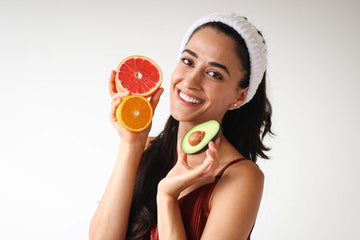Our skin is a remarkable organ, covering approximately 1.5 to 2 square meters of our body, weighing around 1.5 kilograms. It plays a crucial role in protecting against environmental factors, regulating temperature, and providing sensory information. Additionally, the skin serves as a vital barrier against pathogens, chemicals, and UV radiation. It also helps excrete waste products through sweating and contributes significantly to our physical appearance, impacting our social and psychological well-being. Maintaining skin health is essential for overall bodily function and well-being.
Nutrition and Skin Health
Nutrition significantly impacts skin health and aging. A balanced diet rich in fruits, vegetables, lean proteins, and healthy fats provides essential nutrients that support skin structure and function. Antioxidant-rich foods, such as berries and leafy greens, combat oxidative stress, which contributes to skin aging. Conversely, diets high in sugar and processed foods can accelerate aging by promoting inflammation and glycation, damaging collagen and elastin—key proteins providing skin structure and elasticity.
Glycation occurs when sugar molecules bind to proteins and lipids, forming advanced glycation end-products (AGEs). These AGEs accumulate in the skin, cross-linking collagen and elastin fibers, making the skin less flexible and more prone to wrinkles and sagging. AGEs also trigger an inflammatory response, increasing cytokines and other inflammatory molecules, exacerbating skin conditions like acne, rosacea, and eczema.
Essential Nutrients for Healthy Skin
Key vitamins and nutrients are essential for maintaining healthy skin:
- Vitamin A: Promotes cell turnover and collagen production, reducing wrinkles. Found in carrots, sweet potatoes, pumpkin, spinach, kale, liver, and egg yolks.
- Vitamin C: A potent antioxidant that protects against UV damage and supports collagen synthesis. Found in citrus fruits, strawberries, kiwi, bell peppers, broccoli, and Brussels sprouts.
- Vitamin D: Helps repair skin damage and maintain barrier function. Found in fatty fish, fortified foods, egg yolks, and mushrooms.
- Vitamin E: Provides antioxidant protection and supports skin healing. Found in almonds, sunflower seeds, hazelnuts, avocados, spinach, and broccoli.
- Omega-3 Fatty Acids: Anti-inflammatory properties support skin hydration and elasticity. Found in fatty fish, flaxseeds, chia seeds, and walnuts.
- Zinc: Important for skin healing and inflammation control. Found in oysters, lean meats, poultry, beans, nuts, seeds, and whole grains.
- Coenzyme Q10: Reduces fine lines and wrinkles by supporting cellular energy production and protecting against oxidative damage. Found in oily fish, organ meats, and whole grains.
- Polyphenols: Anti-inflammatory properties and protection against UV damage. Found in green tea, grapes, berries, dark chocolate, and olive oil.
- Resveratrol: Anti-aging and anti-inflammatory effects. Found in red grapes, red wine, berries, and peanuts.
- Flavonoids: Anti-inflammatory and skin-soothing properties. Found in various fruits, vegetables, tea, and chocolate.
- Selenium: Protects against oxidative damage and supports skin elasticity. Found in Brazil nuts, fish, eggs, and whole grains.
- Lycopene: Provides UV protection and reduces skin redness. Found in tomatoes, watermelon, and pink grapefruit.
The Gut Microbiome and Skin Health
The gut microbiome plays a crucial role in skin health through the gut-skin axis. A balanced gut microbiome supports a healthy immune system and reduces inflammation, improving skin conditions like acne, eczema, and psoriasis. Dysbiosis, or an imbalance in gut bacteria, can lead to increased inflammation and oxidative stress, accelerating skin aging. Probiotics and fermented foods such as sauerkraut, kimchi, kefir, and kombucha, along with a diet rich in fiber, support a healthy gut microbiome, positively impacting skin health.
Lifestyle Factors Affecting Skin Health
Several lifestyle factors can negatively impact skin health and accelerate aging, including:
- Smoking: Reduces blood flow to the skin and damages collagen and elastin.
- Excessive Alcohol Consumption: Dehydrates the skin and depletes essential nutrients.
- Poor Diet: Lacking in essential vitamins and minerals can lead to dull, sagging skin.
- Lack of Sleep: Poor sleep quality increases stress hormone levels, causing inflammation and accelerating skin aging.
The Role of Antioxidants in Skin Health
Antioxidants neutralize free radicals, unstable molecules that damage skin cells and accelerate aging. By reducing oxidative stress, antioxidants help prevent collagen breakdown and protect against UV damage. Common antioxidants beneficial for the skin include vitamins C and E, green tea extract, and coenzyme Q10. Incorporating antioxidant-rich foods and skincare products can help maintain a youthful complexion.
Preserving Youthful Skin
To maintain youthful skin, consider these effective dietary and lifestyle strategies:
- Healthy Diet: Consume a diet rich in antioxidants, vitamins, and minerals. Foods like citrus fruits, berries, leafy greens, fish, and bone broth are beneficial.
- Sun Protection: Use broad-spectrum sunscreen daily and wear protective clothing to prevent collagen breakdown caused by UV radiation.
- Avoid Smoking and Excessive Alcohol: Both can deplete nutrients essential for collagen synthesis and increase oxidative stress.
- Hydration: Keep the skin well-hydrated to maintain its health and resilience.
- Topical Treatments: Products containing retinoids, peptides, and antioxidants can stimulate collagen production and protect existing collagen.
- Professional Treatments: Procedures like micro-needling, laser therapy, and chemical peels can promote collagen production by stimulating the skin's healing process.
- Supplements: Hydrolyzed collagen peptides can support the body's collagen levels, improving skin hydration, elasticity, and reducing wrinkles.
Maintaining skin health requires a holistic approach, encompassing a balanced diet, proper hydration, regular exercise, and adequate sleep. Antioxidant-rich foods and key vitamins like A, C, D, and E are crucial for skin health and reducing wrinkles. Managing stress and protecting the skin from UV damage are also vital. Incorporating probiotics for gut health and following a consistent skincare routine can further support youthful, healthy skin. By adopting these practices, you can slow down the aging process and maintain a radiant complexion for years to come.









